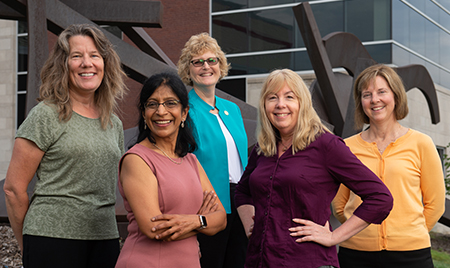 Flipped teaching, a creative approach that shifts lectures from scheduled class time to other formats like online video, has been shown to increase student learning and motivation. Yet, barriers and resistance to the instructional reversal remain.
Flipped teaching, a creative approach that shifts lectures from scheduled class time to other formats like online video, has been shown to increase student learning and motivation. Yet, barriers and resistance to the instructional reversal remain.
Now, the National Science Foundation (NSF) has awarded $598,402 in funding to Southern Illinois University Edwardsville to support a rigorous endeavor that will allow researchers to spread the innovative student-centered teaching method to other faculty members in the STEM (science, technology, engineering and mathematics) discipline at SIUE and St. Louis Community College.
The research project, “Examining Faculty Attitudes and Strategies that Support Successful Flipped Teaching,” is under the direction of principal investigator Chaya Gopalan, PhD, associate professor in the Schools of Nursing, and Education, Health and Human Behavior.
Her co-PIs include SIUE STEM Center Director Sharon Locke, PhD; STEM Center Research Assistant Professor Georgia Bracey, PhD; SIUE Faculty Development Director and Professor of Psychology Lynn Bartels, PhD; and St. Louis Community College-Forest Park Acting Provost Julie Fickas, PhD.
“We are passionate about finding ways to help students become independent learners and scholars,” Gopalan said. “I am both thrilled and thankful for the competitive award we have received from the NSF in support of this important work, and I thank my collaborators for their full support of this project.”
Under the flipped classroom approach, lecture content is introduced outside the classroom, allowing more time during class to process the information and practice the content in a variety of active learning strategies, including teamwork and instant feedback.
Gopalan’s SIUE STEM Center 2016-17 Faculty Fellowship aided in the expansion of her research and pursuit of this NSF award.
“Improving teaching and learning in STEM classrooms to attract and retain students in this field is a priority, and thus most efforts to reform undergraduate STEM education are primarily through in-class innovations,” Gopalan said. “I have always been interested in STEM, because while it requires commitment to learning challenging concepts, it also offers opportunities for innovation that lead to growth and success not only for the individual students, but also for the greater public.”
The three-year research project will involve a significant number of faculty participants who will implement flipped teaching in their classrooms. Both quantitative and qualitative research methods will be used to examine faculty perceptions, attitudes and intentions about flipping their classrooms. Students will also be surveyed so researchers can learn of their experiences with the new teaching method.
“This project will provide STEM educators and institutions with critical information about what is needed for broad implementation of flipped courses across different STEM departments and at different types of institutions, including master’s comprehensive and community college,” Gopalan explained. “Successful implementation is expected to improve retention and success in STEM, including retention of students who are from historically underrepresented groups.”
According to Gopalan, significant products from the NSF-funded research project will include a flipped teaching implementation framework, a set of design principles for flipped STEM courses, and new flipped teaching curriculum materials that will be made widely available through free, online STEM education repositories.
“Since this NSF grant is limited to STEM faculty only, my goal is to find other mechanisms to spread flipped teaching methodology to non-STEM faculty at SIUE in the near future,” Gopalan concluded.
Photo: The NSF has funded a research project aimed at advancing flipped teaching in STEM education, under the direction of collaborators from SIUE and St. Louis Community College, including (front L-R) Chaya Gopalan, Sharon Locke, (back L-R) Georgia Bracey, Julie Fickas and Lynn Bartels.